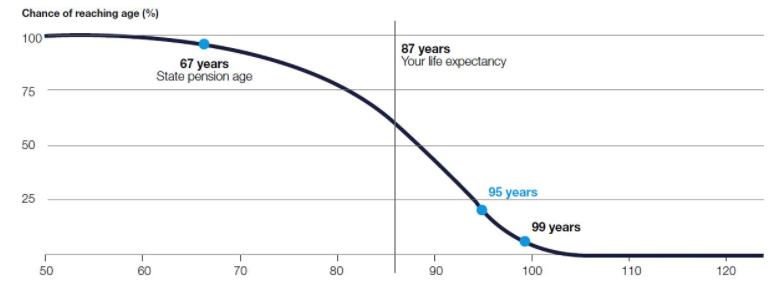
The Centurions: How to plan for a 100-year life
Significant increases in life expectancy mean that many of us may well celebrate our 100th birthday.
That means more time with the people you love, but it could also put extra pressure on your finances.
According to the Office for National Statistics, the average 50-year-old woman has a life expectancy of 87 years. However, there is a one in four chance of living to 95 years and a 7% chance of living to 100 years1. Your money may need to last three, or even four, decades in retirement.
To ensure you can enjoy a long and comfortable retirement, it is crucial to plan ahead. Here are some questions to ask yourself.
When do I plan to retire?
The age at which you retire will have a big impact on your future finances. The longer you work, the less time your money will need to last. You will also have more time to save, receive pension tax relief, and potentially benefit from stock market growth.
Bear in mind that retirement is no longer the cliff-edge it once was. Many people take a phased retirement, where they gradually reduce their hours by working part-time or on a consultancy basis. This could alleviate some of the pressure on your pension pot, while enabling you to retain the stimulation and social engagement that work offers.
What are my goals and aspirations?
Your life goals and aspirations will also affect your wealth in retirement. Travelling the world, for example, is likely to cost significantly more money than pottering around your garden.
It is difficult to predict how your needs and goals could change in your later years. An adviser can use tools to demonstrate the effect of your decisions, as well as the events that may be outside your control.
How much income do I need?
Calculating how much income you need in retirement is challenging. After working hard for decades, you will no doubt want to enjoy your newfound freedom. However, if you withdraw too much money, it might not last for as long as you need it to.
There are several ‘rules of thumb’ about what constitutes a sustainable level of income drawdown. The strategy that is right for you will depend on your individual circumstances, including what your dream retirement looks like.
Retirement spending is rarely linear, so a flexible approach is often the best way forward. You might find your spending starts off high as you tick off items from your bucket list, reduces as you get older, and then ramps up again to pay for long-term care.
An adviser can create a bespoke withdrawal strategy that considers your circumstances and needs.
If you’re a 50-year-old woman, your average life expectancy is:
87 years
However there’s a chance you might live longer…

Source: Office for National Statistics
How should I invest my money?
Ensuring your money lasts for 30 or more years is no small feat. You may wish to keep a portion of your money invested in shares, giving it the opportunity to benefit from stock market growth over the long term. Shares can drop in value, so you must be comfortable taking on investment risk.
Spreading your money across other assets, such as bonds and cash, can help to reduce the impact of stock market falls on your overall portfolio. The proportion of money you allocate to each asset class should be in line with your attitude to risk. An adviser can help you to create and maintain a diversified portfolio.
How do I plan for my later life?
The downside of increasing longevity is that many people spend their later years in poor health. You might need to adapt your property, pay for nursing care or move into a care home. With care homes in England charging an average of £600 per week2, this could have a major impact on your wealth.
Planning ahead will put your finances in the best possible shape to pay for long-term care costs.
How do I avoid running out of money?
As well as creating a robust investment and withdrawal strategy, there are several steps you can take to avoid running out of money in retirement.
The first is to consider all your assets, not just your pension. Money in retirement can come from several different sources, including ISAs and savings accounts. Depleting ISAs before pensions may reduce the amount of income tax you pay, as well as help to reduce the amount of inheritance tax your estate owes when you die.
You could also consider downsizing or using products to release the equity in your home, although there are risks involved.
Do I want to leave a legacy?
Many people want to leave a legacy for their loved ones, be it children, grandchildren or even greatgrandchildren. Funding a 30-year retirement and passing on wealth is by no means easy, which is why it is even more important to plan early. Writing a will and structuring your investments tax-efficiently are just some of the steps to discuss with your adviser.
1. www.ons.gov.uk
2. www.ageuk.org.uk
The value of investments, and any income from them, can fall and you may get back less than you invested. Tax treatment depends on the individual circumstances of each client and may be subject to change in the future. Neither simulated nor actual past performance are reliable indicators of future performance. Information is provided only as an example and is not a recommendation to pursue a particular strategy. Information contained in this document is believed to be reliable and accurate, but without further investigation cannot be warranted as to accuracy or completeness. Opinions expressed in this publication are not necessarily the views held throughout Brewin Dolphin Ltd.